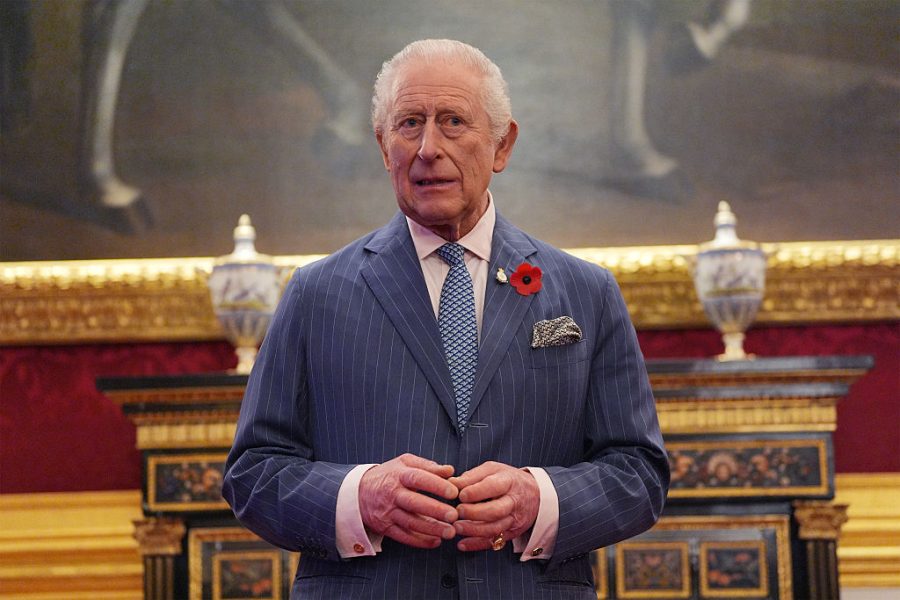Donald Trump has yet to comment on the Prince Andrew ‘Chinese spy’ story, and online sleuths are already trying to join the vague dots between Trump, Jeffrey Epstein, and the Duke of York. But the real story about Donald Trump and monarchy is the extent of his admiration for the British crown. At the big reopening of Notre Dame cathedral, other heads of state seemed desperate to make their impression on the President-elect. Yet for Trump, what really mattered was his encounter with the Prince of Wales.
‘I had a great talk with the prince,’ Trump told the New York Post. ‘He’s a good-looking guy,’ the President-elect went on. ‘He looked really, very handsome last night. Some people look better in person. He looked great. He looked really nice, and I told him that.’
For Trump, the monarchy symbolises something transcendent: a continuity of history, tradition, and stability
As any good royalist will tell you, Trump’s affection for the monarchy underscores the institution’s enduring significance – and his goodwill towards Britain. It highlights the monarchy’s unique soft power in bridging international divides and tempering political tensions.
Yet there’s also something more subtle going on in the relationship between Trumpian politics, the power of fame, and the concept of monarchy. The emergent American appreciation for royal tradition stands in stark contrast to the waning influence of Hollywood, whose cultural arbiters find themselves increasingly on the outs in an America focused on reclaiming its greatness.
Once America’s foremost cultural influence, Hollywood finds its sway diminishing, a reality starkly highlighted during the 2024 election. Despite the entertainment industry’s aggressive campaigning against Trump – complete with celebrity endorsements, multimillion-dollar initiatives, and high-profile admonishments – the effort failed decisively.
Voters, it seems, have grown weary of lectures from the gilded hills of California. This is corroborated by the steadily decreasing viewership of the Oscars ‘virtue-signaling’ jamboree.
This disconnection is hardly surprising. Hollywood’s liberal orthodoxy has often clashed with the values of a significant portion of the American electorate. Over time, this cultural elitism, which frequently masquerades as moral superiority, has alienated its audience. The backlash against the entertainment industry’s political activism isn’t merely a critique of its ideological stance – it’s part of a broader political realignment.
The popularity of MAGA has shifted voter focus away from celebrity endorsements and towards tangible issues: economic stability, cultural preservation, and personal security. Sorry Taylor and Beyoncé.
On the losing side of this cultural shift are Prince Harry and Meghan Markle. The couple’s nosedive to ridicule and contempt offers a cautionary lesson. Their cringeworthy attempts to blend royal prestige with Hollywood celebrity have backfired spectacularly, and the President-elect has notably taken offense at their appalling misconduct and bad judgement.
The lesson is clear: the monarchy’s strength lies in its separation from the transient whims of celebrity culture. Harry and Meghan’s missteps underscore the perils of abandoning the monarchy’s foundational values in favor of the fleeting allure of personal fame.
Donald Trump’s reverence for Queen Elizabeth II, warm interactions with King Charles III, and notable meeting with Prince William at Notre Dame illustrate a genuine admiration for the institution. For Trump, like many Yanks, the monarchy symbolises something transcendent: a continuity of history, tradition, and stability, though not their own, that outshines the transient nature of material wealth and political cycles.
Trump’s respect for the monarchy could serve as a bridge. The monarchy’s ability to remain above politics and maintain relationships with leaders across the spectrum aligns well with Trump’s admiration for its endurance and dignity. Such shared respect could foster goodwill between the UK and the US, even amidst policy disagreements, of which there are likely to be an abundance.
For many Americans, fed up with the relentless imposition of progressive ideologies, the British monarchy represents an alluring example – of sense over nonsense; a bastion of duty, tradition, and constancy – in a world increasingly driven by fleeting trends and ideological dogma. Where Hollywood churns out narratives steeped in cultural moralising, the monarchy stands apart, offering a model of quiet service and enduring values.
Figures such as Queen Elizabeth II demonstrated that true leadership is grounded in humility and purpose rather than personal aggrandizement. Her successor, King Charles and the younger generation represented by Prince William and Kate Middleton continue this legacy, balancing tradition with a measured embrace of modernity. For Americans seeking greatness again, this steadfastness is an attractive antidote to the drumbeat of racial and transgender obsessions we have just rejected.
In renouncing the monarchy, Harry and Meghan only underscored its virtues. Their foray into celebrity culture revealed the emptiness of fame and fortune without substance and the depravity of trading duty for self-indulgence.







Comments